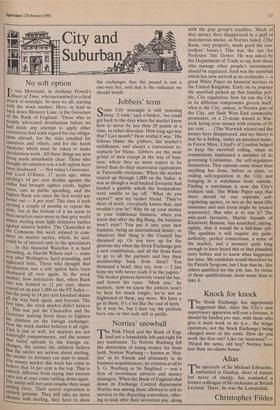Norties' snowball
rr he Pink Floyd and the Bank of Eng- land•are a formidable left-and-right for any marksman. To Norton Warburg fell the distinction of losing money for them both. Norton Warburg — known as 'Nor- ties' to its friends and ultimately to its business acquaintances, no relation at all to S. G. Warburg or Sir Siegfried — was a firm of investment advisers and money managers. When the Bank of England shut down its Exchange Control department Norties was among those allowed to sell its services to the departing controllers, offer- ing to look after their severence pay, along with the pop group's royalties. Much of that money then disappeared in a puff of malodorous smoke, as Norties failed. (The Bank, very properly, made good the con- trollers' losses.) This was the cue for Professor `Jim' Gower. He was asked by the Department of Trade to say how those who manage other people's investments should be regulated. Such was the snowball which has now arrived as an avalanche — a great White Paper on financial services in the United Kingdom. Early on its journey the snowball picked up that familiar peb- ble, City regulation: how far can the City or its different components govern itself, what is the City, anway, is Norties part of the City, are flash West End commodity promoters, or a 21-stone wizard in War- wick luring your money with returns of 91 per cent. . . (The Warwick wizard and the money have disappeared, and my theory is that he is hiding, under an assumed name, in Forest Mere. Lloyd's of London helped to keep the snowball rolling, when its commotions implicated a member of its governing Committee, the self-regulators themselves. That episode came closer than anything has done, before or since, to ending self-regulation in the City and bringing in a watchman from outside. Finding a watchman is now the City's trickiest task. The White Paper says that there should be one supreme self- regulating agency, or two at the most (life insurance and unit trusts might be treated separately). But who is to run it? The ante-post favourite, Martin Jacomb of Kleinwort Benson, has scratched, saying, rightly, that it would be a full-time job. The qualities it will require are guile, authority, perfect connections, a sense of the market, and a memory quite long enough to have heard this or that plausible story before and to know what happened last time. My candidate would therefore be Sir Patrick Sergeant, but I fear that he, like others qualified for the job, has, by virtue of those qualifications, more sense than to take it.










































 Previous page
Previous page